News
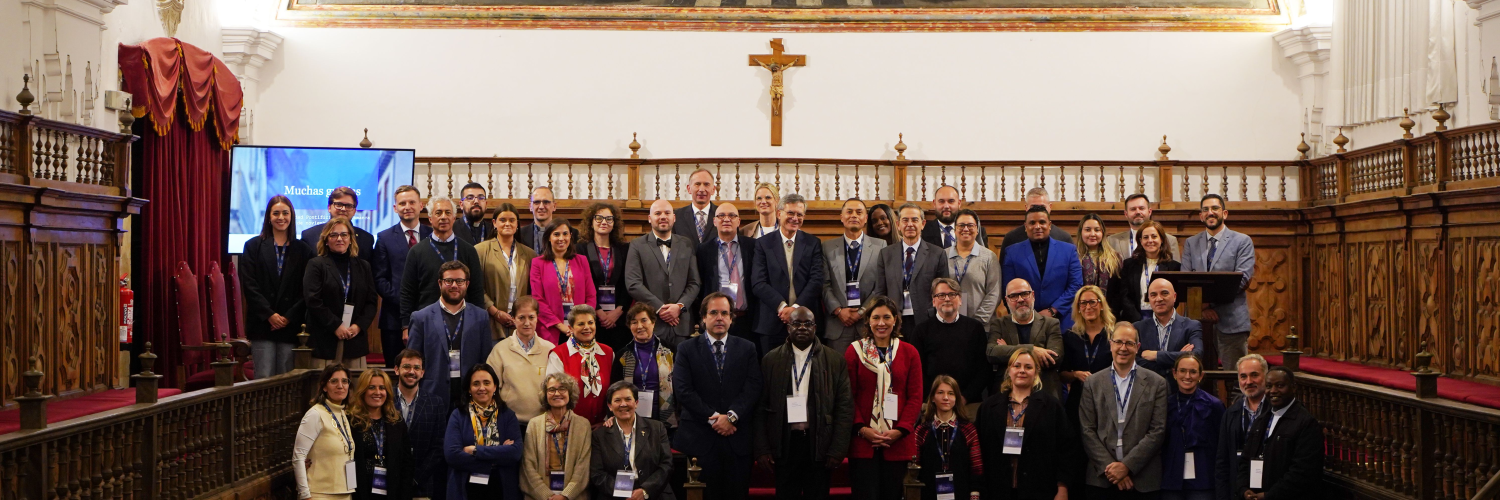
A look back at the international conference "Internal communication in Catholic and pontifical institutions: limits and challenges".
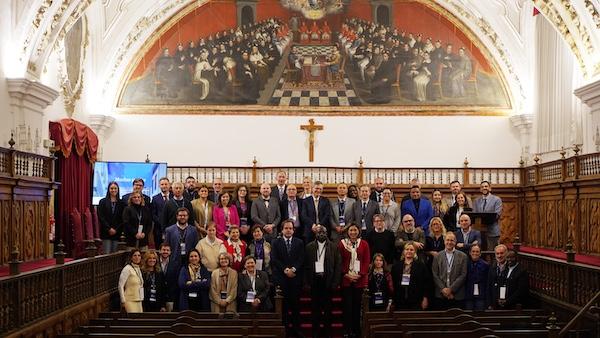
From November 12 to 14, 2025, the Universidad Pontificia de Salamanca (UPSA) hosted the first international congress dedicated to internal communications in Catholic and pontifical institutions, in partnership with the International Federation of Catholic Universities (IFCU). For three days, university managers, communications experts, representatives of the Holy See and researchers explored a strategic issue: strengthening Catholic mission, trust and identity through institutional communications adapted to contemporary challenges.
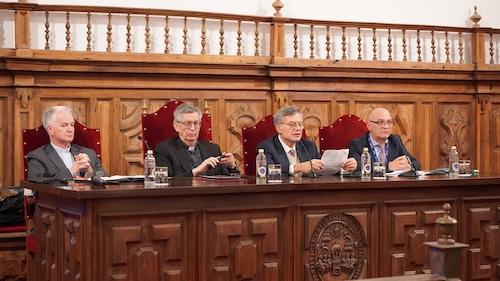
Day 1 - Identity, governance and corporate vision
The congress opened with Prof. Santiago García-Jalón de la Lama, Rector of UPSA, reminding us that internal communication is a constitutive dimension of university life:
"In a Catholic university, to communicate is to exercise a form of intellectual and institutional charity. "
The Prefect of the Dicastery for Communication, Dr. Paolo Ruffini, warned against the logics of dehumanization proper to contemporary digital environments:
"Where communication ceases to be a human encounter, it becomes a mechanism of isolation. "
In a message conveyed by Loïc Roche, IFCU Secretary General, Dr. François Mabille, insisted on three major convictions:
-
internal communication is a pillar of the mission,
-
it must become a space for synodality,
-
it is the foundation of a shared institutional culture.
The evening continued with a talk by Mgr Paul Desmond Tighe, Secretary of the Dicastery for Culture and Education, on the role of universities in the age of artificial intelligence.
He stressed that AI represents a major turning point for academic institutions, inviting Catholic universities to assume a particular responsibility: ensuring that technologies remain at the service of the human person. Bishop Tighe stressed the importance of training that develops not only technical skills, but also ethical discernment, so that AI fosters creativity, relationship and the search for meaning rather than isolation or dehumanization.
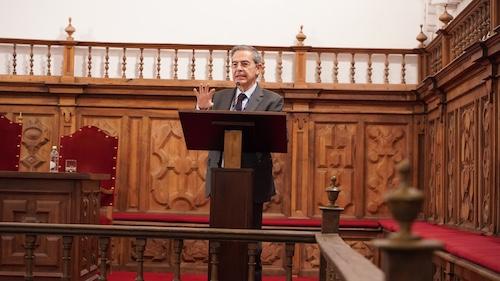
Juan Manuel Mora's lecture: communication as institutional architecture
The first day concluded with a structuring talk by Juan Manuel Mora, Vice-rector for Communication at the Pontificia Università della Santa Croce (Rome).
He argued that:
Internal communication doesn't describe the institution: it builds it.
In his view, internal communication is an invisible architecture articulating governance, cohesion, collective learning and the capacity for institutional transformation. He advocated "authentically academic" communication, based on intellectual rigor, dialogue and the quest for the common good.
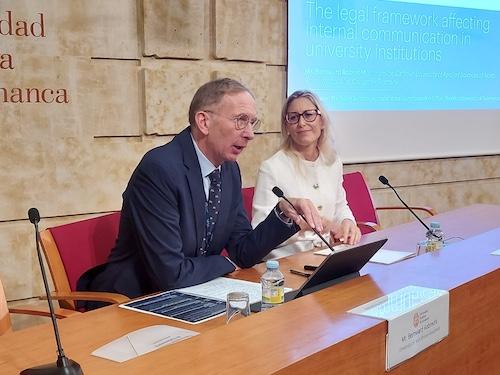
Day 2 - Strategies, audiences and institutional practices
The second day was devoted to internal communication practices, methods and systems.
Marta Yuste, Director of Communications at the Universidad Católica de Ávila, presented eight keys to effective communication, emphasizing audience knowledge, institutional coherence and the judicious use of technology.
A panel discussion moderated by Dr Michaela Moldová Chovancová (Catholic University of Ruzomberok) highlighted the importance of the student profile in internal strategies.
Prof. Ángel Losada Vázquez (UPSA) highlighted AI's contribution to improving dialogue and personalization.
Bernward Robrecht: trust as an institutional foundation
The after-midday session featured an outstanding speech by Dr. Bernward Robrecht, Chancellor of the Katholische Hochschule Nordrheinland-Westfalen (KatHO NRW).
He has identified three pillars of reliable internal communication:
-
Data protection, a moral and legal duty.
-
Information security, a prerequisite for trust.
-
Mandatory annual training to ensure a solid corporate culture.
He concluded:
"Good internal communication creates trust, builds belonging and nurtures a shared Catholic identity. "
Opening the afternoon session, Dr. Carlo Gallucci, Vice-Rector of Ramon Llull University (Barcelona), spoke on university governance models, highlighting how they can either hinder or facilitate coherent and centralised internal communication, directly echoing the core issues addressed by the congress.
Panel of institutional experiences
The panel included :
-
Verena Behr, Head of Internal Communications, KatHO Cologne
-
Dr Giovanni Tridente, Head of Corporate Communications, Università della Santa Croce
Moderator: Débora García, Communications Director, UPSA
The speakers described their internal systems and the challenges specific to multicultural communities.
The day ended with Juan Ramón Martín San Román (UPSA) on the role of clear language and user experience.
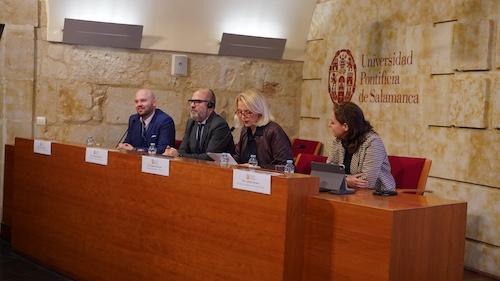
Day 3 - Artificial intelligence and global perspectives
Giovanni Tridente: a humanist compass for the AI era
The lecture by Dr Giovanni Tridente, Professor and Head of Corporate Communications at Università della Santa Croce, offered a profound anthropological reflection.
He structured his talk around four knowledges - being, doing, acting, accompanying - conceived as an ethical compass to guide the use of AI in Catholic institutions.
His central thesis:
"Artificial intelligence must augment human relationships, never replace them. "
Round table on the cultural transformation of AI
Moderated by Suzana Obrovac, Director of Public Relations at the Catholic University of Croatia, the round table showed that AI represents a global institutional change, affecting processes, governance, training and internal culture.
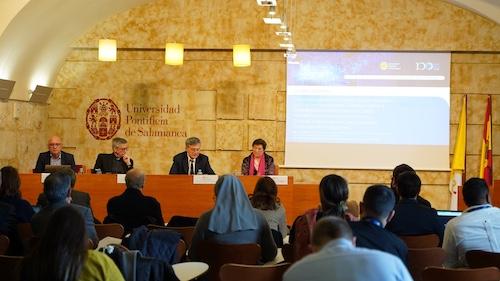
Closing: towards a new IFCU communications network
The final session brought together a number of institutional leaders, including Paolo Ruffini, Prefect of the Holy See's Dicastery for Communication, whose speech was a highlight of the symposium. He reminded the audience that the mission of communications in the Church and Catholic universities is not just a technical one: it is intrinsically linked to truth, trust and the service of the common good. In a climate saturated with disinformation and manipulation, he stressed the need to "rebuild reliable communication", capable of bringing people back to reality, fostering spaces for authentic dialogue and supporting the educational and social mission of Catholic institutions.
Ruffini also emphasized that credibility cannot be imposed: it must be built through consistency, transparency, listening and attention to the most vulnerable. An institution that communicates well is, in his view, one that knows how to "put people at the center" and develop a relational culture based on trust.
The meeting benefited from the partnership of the Cardinal Ruffini Chair, an academic program dedicated to the study of transformations in the contemporary Church and the cultural, social and media issues that influence ecclesial life. The Chair supports interdisciplinary work aimed at strengthening a culture of dialogue, research and responsible communication.
Dr María Jesús Domínguez, representative of the Missionary Social Service Society, recalled that :
"Attentive communication is a communal gesture of mutual care. "
She emphasized the ethical dimension of communication when it is seen as a form of solidarity, proximity and shared responsibility within educational communities.
On behalf of the International Federation of Catholic Universities (FIUC), Loïc Roche, Director of Communications and Strategy, announced :
-
the creation of the new IFCU communications network, designed to bring together communications managers from Catholic universities around the world, foster cooperation, share practices and strengthen international links;
-
the next IFCU congress on Catholic university branding, proposed by KatHO NRW (Cologne) and scheduled for October 18-21, 2026.
In conclusion, the rector of the organizing university, Pr Santiago García-Jalón de la Lama, offered a reflection that placed institutional communication at the heart of the university's mission. He stressed that communication is not an operational appendix, but a genuine mission vector, a space where the university's identity, reputation and ability to reach out to society are built. For him, communication means "giving meaning", making academic, social and ecclesial commitment visible, and bearing witness to the coherence between the educational message, institutional life and daily action.
He also reminded us that, in a fragmented world, universities have a duty to embody a model of responsible communication, capable of creating trust and collective intelligence.
A milestone for Catholic universities
This congress inaugurated a new dynamic in Catholic higher education worldwide. It showed :
-
the strategic role of communication in the educational mission ;
-
the importance of trust and institutional security ;
-
the opportunities of humanistic AI ;
-
the need to structure sustainable international collaboration.
Communicating at a Catholic university means serving truth, communion and mission.









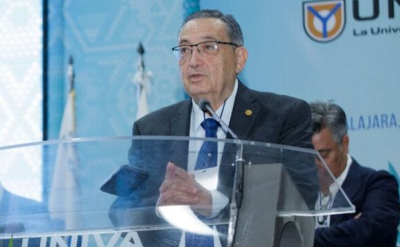
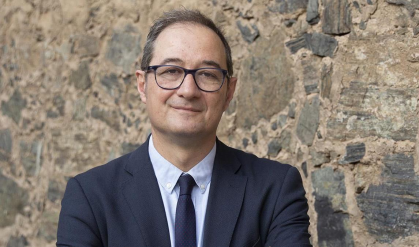
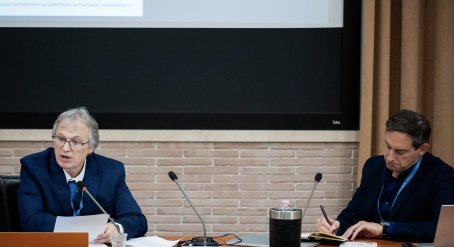


No comment
Log in to post comment. Log in.